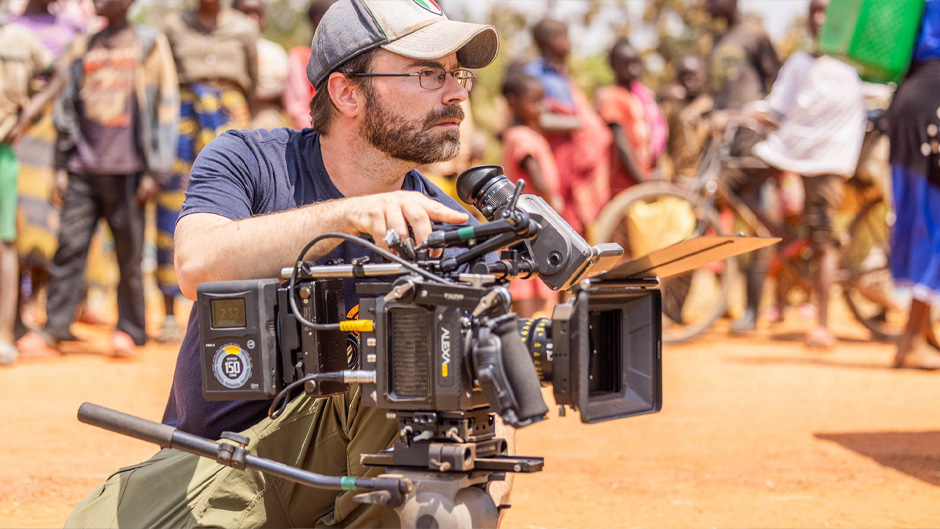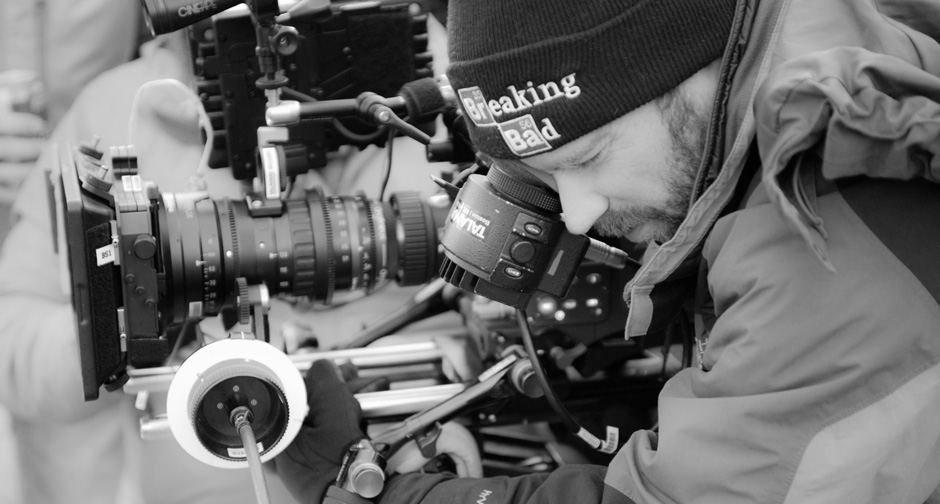Two lenses are better than one
Rick Galli honed his talents as both writer and filmmaker while at the University of Miami, a combination that positioned him for unique success.

By Michael R. Malone
1-23-2025
This story originally appeared at News@TheU.
With 20 years as a filmmaker under his belt, alumnus Richard “Rick” Galli has worked on a tapestry of well-known TV shows and films—such as “Breaking Bad,” “Better Call Saul,” and “The Avengers”—and enjoyed a panorama of experiences.
Yet filming in Rwanda, where he documented the success of the nonprofit Impact Hope program in teaching trade skills to teens orphaned by the genocide, is among his most memorable.
“These were horrible, heartbreaking stories. They were children who had seen their parents massacred in front of them. But now, through the Hope school, they were learning trades that readied them to enter the workforce with a skill,” said Galli, who graduated in 2005 with a B.S. from the University of Miami School of Communication.
The skills that the teens were learning—culinary, electrician, hair, make-up, among others—were much-needed in the local economy.
Yet as much as he was inspired by the resilient teens, Galli was impacted by the humanity of the people in the war-torn, east-central African country.
“Being in Rwanda was incredible. There were so many lovely, friendly, outgoing, and curious people who are perfectly content with what we would call a very meager living style,” Galli said. “Every single person was so friendly. We’d be driving anywhere, stop to get a good shot of a vista, and in no more than 10 seconds, we’d be surrounded by people eager to watch.”
The film was promoting the Impact Hope school while tracking the successful trajectories of some of its alumni. That focus prompted Galli to reflect on how his own life and career as a cinematographer, colorist, director, and writer have benefited from a network of University of Miami alumni.
“The film industry has everything to do with connections. We’re kind of like baseball cards, traded from set to set, and the expression, ‘We’ll see you on the next one,’ is very literal,” Galli said. “The set is like a classroom where you’re walking around, seeing folks and, ‘Oh, I remember you.’ We’re truly a family.”
Galli first experienced his love for film in the sixth grade and “it just exploded from there.”

“I became hooked with visual storytelling, and the camera was my new appendage. It was like having a portal, a time machine, a device for growing dreams,” he writes on his website.
When it came time for college, the best known film schools were at the top of his list. The University’s program was gaining some prominence at the time but was only a fallback option—until he and his dad paid a visit.
“My first few steps onto the campus, I fell completely in love. I saw the new School of Communication building (finishing renovations at the time) and their sound stages, and it immediately started rising in my mind,” he remembered.
Galli was especially interested in film production. “Unlike some of the other programs, at the University I could get a camera in my hands in my first year,” he said.
And he did. Galli signed up and worked for a number of UMTV shows, got to know the people in the equipment room, and immersed himself in the campus film world. As a sophomore, he developed digital filmmaking skills and made his very first 16mm film.
“I got so much experience in Miami and learned from some excellent professors, such as Sanjeev Chatterjee,” he said. “And through postings and connections, I even got to participate in some big commercials off-campus as a student. Having an A-list actor standing next to me and the protocol of hundreds of people on set—that was my grad school and an education in itself.”
The connections he made have been golden. After graduation, he moved to Wilmington, North Carolina, to be closer to home. He worked on a few TV shows and was doing well enough until, a year in, state subsidies for productions ended and opportunities faded.
It was right around that time that he got a call from two alumni friends who had graduated and moved to New Mexico. He was considering heading for Los Angeles, but the friends mentioned they had just wrapped up working on a film “No Country for Old Men,” which won an Oscar for best picture in 2008 and multiple other awards, and that opportunities there abounded.
“So I packed my car with a suitcase, camera, and a printer and figured New Mexico was on the way to Los Angeles,” he said. Within a week, he had landed work, largely through connections with his alumni friends.
Galli spent a decade in New Mexico and, through project after project, garnered loads of experience as a filmmaker, colorist, director, and writer. He got into the independent film scene, met his wife, an actor, and their careers blossomed together.
His degree at the University had required a double major, so along with film, Galli had majored in creative writing, which doubled his value as a filmmaker.
Galli explained that some directors of photography (DP) are technically astute; they know every in-and-out of the camera, can rebuild it, fix it, know all the tricks and computers. Other DPs are more on the creative side; they can express the essence of the scene through the lens and manage the dance with the actors and the lighting.
“I fall more toward the middle, though am a bit more creative driven. That’s one of the reasons I get certain jobs, not so much for the tech, but more for the times when the director comes up and says, ‘We’re out of time; we have this entire scene to shoot in one shot. What do we do?’
“That’s the fun part. That’s the playground, and that’s why I do what I do,” Galli said.
Los Angeles—the mecca of all things film—was always in the background, and he and his wife migrated west.
“The biggest part was letting people know I was here, and then it was like, ‘Hey, let’s get coffee, lunch, what are you working on?’” he said. “Some projects materialize, some fade away, but the society and development part is a huge part of the transition and your profession here.”
Galli’s home is often the hub for University alumni in the area—especially when there’s a big football game—and networking is always part of the gathering fun.
In addition to local projects, Galli traveled to Cuba for a film that explored teens grappling with ethics issues. Among his newest projects is one focused on emergency crews in Ukraine who triage and treat wounded soldiers before they’re able to be transported to hospitals.
“The filming is one room in a school, darkly lit, following these people as they work really hard to save a single life,” he explained. “One soldier comes in, then another—it’s a really great documentary, and some people will leave because of its graphic content. It’ll change your idea about war and everything going on over there.”






